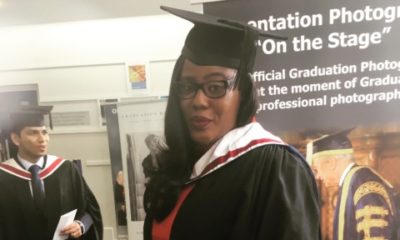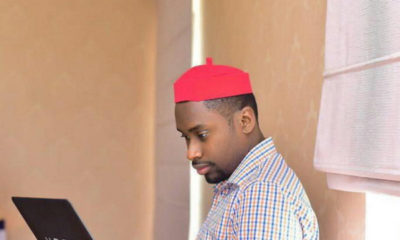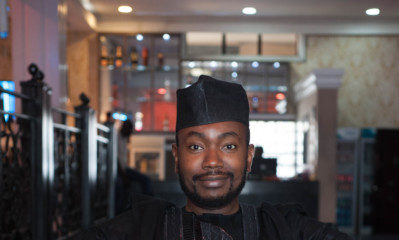Career
Move Back To Nigeria: Leke Awoyinka Speaks on Adding Value to His Industry in his Move Back Experience
 Move Back to Nigeria is a series on BellaNaija which aims to encourage young and not-so-young professionals in the diaspora who are trying to make the decision of whether to move back to Nigeria. In collaboration with the brilliant team at MoveBackToNigeria.com, we hope to bring you a weekly interview with individuals who have successfully made the leap, considering the leap, as well as those who have tried it and realized it is not for them. MoveBacktoNigeria.com’s mission is to showcase stories of Nigerians abroad who have moved back home and are taking giant strides, often against all odds and to serve as inspiration to others.
Move Back to Nigeria is a series on BellaNaija which aims to encourage young and not-so-young professionals in the diaspora who are trying to make the decision of whether to move back to Nigeria. In collaboration with the brilliant team at MoveBackToNigeria.com, we hope to bring you a weekly interview with individuals who have successfully made the leap, considering the leap, as well as those who have tried it and realized it is not for them. MoveBacktoNigeria.com’s mission is to showcase stories of Nigerians abroad who have moved back home and are taking giant strides, often against all odds and to serve as inspiration to others.
This, however, does not preclude us from sharing stories of the people who have moved back and are facing various challenges.
Leke Awoyinka is on the hot seat this week. A sound engineer and content producer, he shares in his own words, his background and motivations for choosing this career path. A path that seems to be currently flourishing in Nigeria and so we’ll leave you to enjoy this feature and also hope you, our dear readers are inspired.
Thanks for graciously agreeing to be profiled. Can you please introduce yourself?
My name is Leke Awoyinka, I am a sound designer, composer and content producer. I run a studio called ‘The Site Studios’ and we provide audio post production services for the film, TV and new media industries; we also produce short film content for brands (e.g. documentaries, corporate videos).
Why did you leave Nigeria?
I left Nigeria to study for my A-levels.
Can you please tell us about your educational background?
I studied Audio Production. However, I initially began studying Computer Systems Engineering at City University, London. I left there to go and study for a Diploma in Audio Production and underwent internships at record labels and studios.
What inspired this interest in Audio Production?
I have always had a great curiosity about wires. I remember one day listening to the radio and I heard two musicians; Fela Kuti and James Brown and I was so struck by their music that I then asked myself, how I could hear this again. So I recorded the radio tracks to cassette tapes and learnt to splice the tape to put my favourite songs beside each other, and started learning the crude side of editing. So from exploring a natural curiosity, that just kind of just led me from one thing to another.
And where did you get your diploma from?
I got the diploma from IMW institute of Music in London.
So whilst studying, you were also interning?
Exactly. While I was studying for a Diploma, I was also working at the recording studio and interning at a record label as well.
Ok. So you completed an internship and Diploma, how then did your career take off?
From making lots of mistakes trying to put out music and trying to collaborate with a lot of people, I spent some time learning under some really good engineers. I had the chance to work with engineers, musicians and producers like Tony Platt, Alan Maudsley, Terence Dudley, Abram Wilson and Troy Miller. I also spent a year as an in-house producer for Jamblock Records in Paris where I secured my first music placements in feature films. I was very lucky to have a varied spectrum of audio work. I worked on as many student and low budget projects as possible to gain experience and build a network.
What came next?
I decided to pursue a Masters degree in Audio Production from the University of Westminster, London. The experience was very intense and very competitive as well but I learnt so much and I also took on a lot of personal projects, first with fellow students and later with small production companies which proved useful.
At what point did Nigeria or Nollywood beckon and you decided to come home?
After I finished my Masters, I was working at Pinewood Studios as a Sound Editor on feature film releases like Captain America, Tintin, Pirates of The Caribbean, which was an amazing learning curve. I had since realised that there was a need for skills such as mine in the growing media industry in Nigeria. I eventually left the UK for Nigeria, but before then, I had been coming home on annual holidays and had started building my studio in Nigeria. Each time I came home, I did a bit more and then, when I had to really commit to finishing off the studio, I moved back like two years ago (2012).
Was there one singular factor you can credit for your moving back to Nigeria?
I would say the opportunities in an emerging market with a growing film & media industry. Of course the chance to be closer to family as well helped that decision.
It has been two years, how has it been for you and how have you found the transition?
Personally, I was initially worried about the reception my skills would face in the industry. Budgets do not always permit for any additional costing such as audio post production. However, those attitudes are changing and gradually the skills are being recognised. More people are starting to realise that there is a need for higher quality productions. We have the distribution in place already, now we just need to keep improving our content.
How did you start work when you arrived?
Initially, I was just trying to network as much as possible. But the film industry or the music industry anywhere is a close knit circle, so I was taking my work around and showing people and trying to get an ‘in’. I was also trying to understand the sounds in Nigeria and watch as much content as possible because it’s a different sound scenario from what is obtainable in Europe. Fortunately, I heard there was an opening at a new online TV station and platform called Ndani TV. So I sent my CV there, and that was really what kicked off my career in Nigeria.When we were going out shooting, or doing post production, we were making so much content and we were moving so much that it was a great way to just breakthrough. I had the opportunity to work with a young, fun and driven team.
You moved on from Ndani?
I went freelance after Ndani but I still work closely with the GTBank brand. I still do some of their sound design and composition work and still keep close contact with the whole team.
Tell us about your studio and what you do there?
The studio is called ‘The Site Studios’ and we build via creativity. We have a green screen studio, a video production suite, a fully equipped Pro Tools recording studio with a large vocal booth and lots of toys. The idea is for a client to be able to come in to start from scratch with an original concept and we are able to do an audio sound design or music production, or video editing or film in that space in the green screen and finish all the post production. So the Site Studios is a one-stop shop.
We can handle ADR, final mix, mastering, Foley, documentary production, jingles, video editing and sound design. We can even mix in surround sound if need be.
Our primary focus has been audio post production because I know that there are quite a few film studios that are coming up, smaller ones, medium sized ones and so, to add value to the industry, I felt I should really focus on my passion which is the audio side of the industry.
We have worked on films such as The Wages, which won the AMVCA Best Short Film 2014, Living Funeral, and also on short form content for companies such as Google, Unilever and The Nike Foundation. We have completed fashion films for Diesel and Timothy Everest as well.
We have created an environment where our clients/artist can feel comfortable and creative whilst we bring world standards to their project.
That’s laudable. And how have you found it running your own studio/ business in Nigeria?
One of the major challenges is staff. I am not finding it easy to find the right sort of person to train and take over junior studio duties. In order to grow, we need more hands on deck to take over the work distribution. Another obstacle is getting people to understand the importance of setting aside budget for good audio post production.
Running the studio also has massive benefits since I have been able to connect with some amazing artists and creatives in Nigeria. The studio has a very relaxed and open atmosphere so at times its just buzzing with stylists, vocalists and instrumentalists.
How old is The Site Studio?
The Site Studios is now a year old.
What would you say has been the best thing to have happened to you in Nigeria?
I think the variety of work I have been able to do. I have been able to do a variety of work, which would have taken me quite a few more years to accomplish abroad as my own company. I have been able to work with brands such as Google, the Nike foundation, GTBank and Unilever and deliver work for them that goes out on wide- scale distribution. One of the films we worked on was shown at Buckingham Palace this year as part of the Unilever Sustainability Initiative.
Another thing has been the opportunity to learn about shooting in Africa, Nigeria to be precise. This is because it is totally different to anywhere in the world. In fact one of the services we offer is to provide localised crew and production services for international companies who are planning to shoot in Nigeria. I have travelled around Nigeria and West Africa on short documentary projects for NGOs.
Where do you hope to take the brand in the next three to five years, what are the long term plans?
The long term plan for the brand is to become one of the top post production houses in Africa. Having long term relations with up and coming directors and established directors, people know they can send us their work from anywhere and we can deliver. In addition, I have launched a digital record label called Mizchif Records.
When I look at the music industry in Nigeria, I feel that there is still a lot of space in the sonic landscape for more left field artist, rock, folk, funk, punk, electronic, house, you name it. With the label we are launching, it is a lot more left field and a platform for alternative Nigerian artistes to release music. Look out for Mizchif Records, with acts like EKiti Sound System, CHiFY, House of Mizchif, Tasti Dosh and lots more. We are definitely doing something different here.
Most importantly, I want to devise some audio workshops and seminars to help train other people interested in sound. There is a great and fulfilling career awaiting anyone who has the curiosity and patience.
With the skills people like you are bringing to Nollywood, does this translate to an uplift in the quality of the output?
Yes, I hope so. I have had a couple of really interesting conversations this year, with older practitioners in the industry and there is a definite realisation that we need to up our game in post production. We have got our story telling, we have got the equipment on ground, we have got our distribution, all that is left is to polish.
I definitely want to teach and hold technical seminars/workshops as well. I believe if more people can be up-skilled, then it raises the bar across the industry.
Finally, based on your experiences, what would you say to people who are considering moving back to Nigeria?
As a lot of people say you should definitely have a plan before moving back, I would add to this by saying “you should look for how you can add value to an industry”. So many sectors are developing and so, there are lots of ventures people can pursue. I think it’s best to look for how you will add value and understand the existing market and its peculiarities before you jump.
Many thanks for your time and best wishes moving forward.
______________________________________________________________________________________________________
The primary objective of MoveBackToNigeria.com is to connect Nigerian professionals with various opportunities in Nigeria, ranging from recruitment drives to information & support regarding relocation processes, financial & tax advice and much more. Move Back To Nigeria also features social interest topics such as what’s on, where to live, how-to survival tips and so on. Consistently engaging with and featuring Nigerian professionals in weekly interviews, Move Back To Nigeria regularly publishes social interest articles relevant to the general public. Everyone is welcome to their online discussions & fora and you are invited to air your views & suggestions on the topical and trending matters section. For more information and further inquiries, please contact [email protected]























